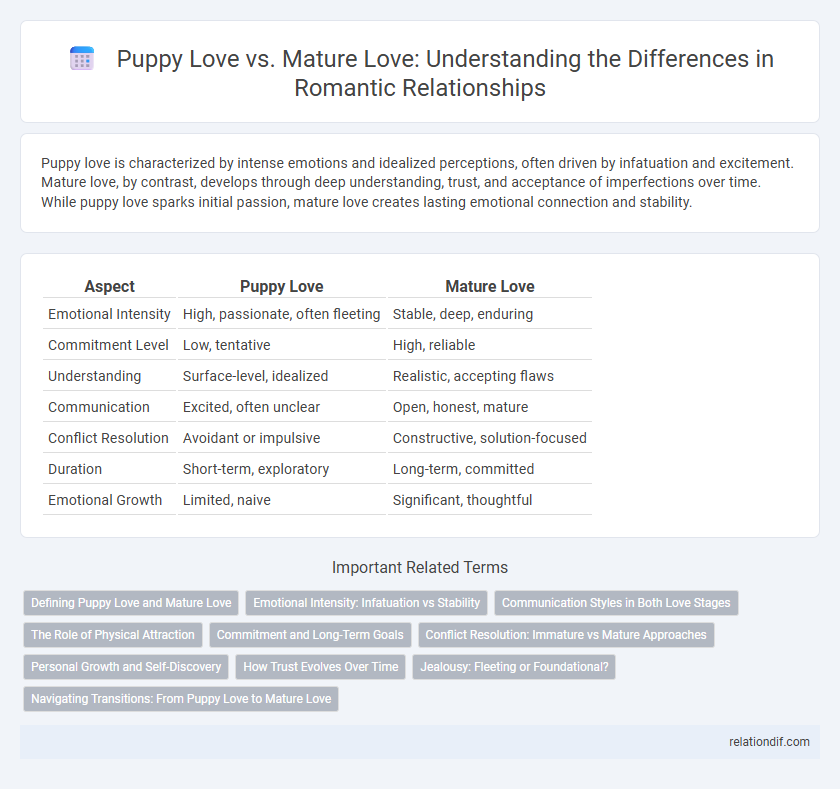Puppy love is characterized by intense emotions and idealized perceptions, often driven by infatuation and excitement. Mature love, by contrast, develops through deep understanding, trust, and acceptance of imperfections over time. While puppy love sparks initial passion, mature love creates lasting emotional connection and stability.
Table of Comparison
| Aspect | Puppy Love | Mature Love |
|---|---|---|
| Emotional Intensity | High, passionate, often fleeting | Stable, deep, enduring |
| Commitment Level | Low, tentative | High, reliable |
| Understanding | Surface-level, idealized | Realistic, accepting flaws |
| Communication | Excited, often unclear | Open, honest, mature |
| Conflict Resolution | Avoidant or impulsive | Constructive, solution-focused |
| Duration | Short-term, exploratory | Long-term, committed |
| Emotional Growth | Limited, naive | Significant, thoughtful |
Defining Puppy Love and Mature Love
Puppy love, often experienced in adolescence, is characterized by intense emotions, idealization, and infatuation with limited depth or understanding of long-term commitment. Mature love develops through emotional growth, trust, and deep connection, emphasizing empathy, patience, and realistic expectations within a relationship. Defining these forms of love involves recognizing puppy love as a fleeting, surface-level affection, while mature love represents a complex, enduring bond built on mutual respect and shared experiences.
Emotional Intensity: Infatuation vs Stability
Puppy love is marked by intense emotional highs and overwhelming infatuation, often driven by novelty and idealization. Mature love prioritizes emotional stability, deep understanding, and consistent support, fostering resilience through challenges. The shift from fleeting excitement to enduring connection distinguishes transient passion from lasting partnership.
Communication Styles in Both Love Stages
Puppy love often features playful, spontaneous communication marked by simple expressions of affection and frequent texting or social media interactions. Mature love relies on deeper, more meaningful conversations with active listening, emotional vulnerability, and conflict resolution skills, fostering long-term understanding and trust. Effective communication in mature relationships leads to stronger emotional bonds and greater relationship stability compared to the impulsive expression typical of puppy love.
The Role of Physical Attraction
Physical attraction often sparks puppy love by creating an immediate and intense emotional response based primarily on appearance and charm. In mature love, physical attraction evolves into a deeper appreciation that complements emotional intimacy and shared values, enhancing the bond beyond initial infatuation. Neuroscientific studies reveal that dopamine-driven excitement characterizes puppy love, whereas oxytocin supports long-term attachment in mature relationships.
Commitment and Long-Term Goals
Puppy love is often characterized by intense emotions and fleeting attraction, lacking the deep commitment required for long-term success. Mature love emphasizes mutual respect, shared values, and intentional planning toward future goals such as marriage, family, and financial stability. Commitment in mature love fosters trust and resilience, enabling couples to navigate challenges and grow together over time.
Conflict Resolution: Immature vs Mature Approaches
Puppy love often struggles with conflict resolution due to emotional impulsiveness and a lack of effective communication skills, leading to misunderstandings and prolonged disputes. In contrast, mature love embraces empathy, active listening, and compromise, fostering healthier and more constructive resolutions. Research in relationship psychology highlights that couples practicing mature conflict management report higher satisfaction and long-term stability.
Personal Growth and Self-Discovery
Puppy love often serves as an early stage of emotional development, providing a safe space for individuals to explore feelings and personal boundaries. Mature love emphasizes deep personal growth and self-discovery, fostering emotional resilience and authentic connection. The transition from puppy love to mature love reflects a journey towards heightened self-awareness and meaningful partnership.
How Trust Evolves Over Time
Puppy love is characterized by intense emotions and idealized perceptions, where trust is often instantaneous but fragile due to limited shared experiences. In mature love, trust develops gradually through consistent reliability, open communication, and overcoming challenges together, forming a deep emotional bond. This evolution of trust transforms affection from superficial attraction to enduring commitment.
Jealousy: Fleeting or Foundational?
Jealousy in puppy love often manifests as a fleeting emotion fueled by insecurity and unfamiliarity with deeper emotional bonds. In mature love, jealousy tends to reflect a foundational awareness of the partner's importance and a desire to protect the relationship's trust. Understanding these distinctions highlights how emotional growth transforms jealousy from a momentary feeling to a meaningful signal within a committed partnership.
Navigating Transitions: From Puppy Love to Mature Love
Puppy love, characterized by intense emotions and idealized perceptions, serves as an essential foundation for understanding romantic feelings. Navigating the transition to mature love involves developing emotional intelligence, fostering trust, and embracing vulnerability to build deeper connections. Successful transformation requires patience, communication, and a willingness to evolve beyond surface-level attraction toward lasting commitment.
puppy love vs mature love Infographic

 relationdif.com
relationdif.com